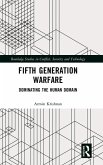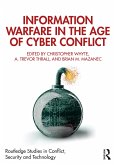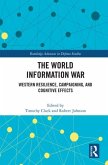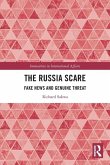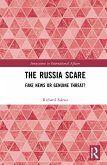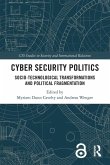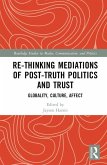This book explores the conceptual, historical, and ethical issues of information conflict to present a detailed analysis of cognitive warfare.
Is it possible for liberal democracies to deliberately use information on civilian populations to impact political and social institutions? While information conflict has been a part of political conflict, warfare, and international relations for as long as there has been political competition, given that our modern political and social lives are saturated by information, we are now faced with a pressing set of reasons to understand cognitive warfare, and to place it in a wider historical and technological context. This book identifies a series of conceptual and ethical challenges facing liberal democracies around modern information conflict. Drawing from historical practices, it suggests that two values - human dignity and political autonomy - can explain why some acts of cognitive warfare might be judged to be good while otheracts are judged to be bad.
This book will be of much interest to students and researchers of intelligence studies, ethics, security studies, and International Relations.
Chapters 7 and 9 of this book are freely available as a downloadable Open Access PDF at http://www.taylorfrancis.com under a Creative Commons Attribution (CC-BY) 4.0 license.
Is it possible for liberal democracies to deliberately use information on civilian populations to impact political and social institutions? While information conflict has been a part of political conflict, warfare, and international relations for as long as there has been political competition, given that our modern political and social lives are saturated by information, we are now faced with a pressing set of reasons to understand cognitive warfare, and to place it in a wider historical and technological context. This book identifies a series of conceptual and ethical challenges facing liberal democracies around modern information conflict. Drawing from historical practices, it suggests that two values - human dignity and political autonomy - can explain why some acts of cognitive warfare might be judged to be good while otheracts are judged to be bad.
This book will be of much interest to students and researchers of intelligence studies, ethics, security studies, and International Relations.
Chapters 7 and 9 of this book are freely available as a downloadable Open Access PDF at http://www.taylorfrancis.com under a Creative Commons Attribution (CC-BY) 4.0 license.
"[This] is the first book-length investigation of a critically important topic -states' use of disinformation and information manipulation to target the beliefs and attitudes of foreign citizens through platforms such as social media. Dr. Henschke explains the ethical, political, and conceptual dimensions of this topic and compellingly demonstrates how these tactics erode the foundation of liberal democracy by undermining citizens' trust in political and social institutions and the concept of truth itself. This is an important and timely book that should be essential reading for scholars, students, and anyone who is interested in the preservation of democratic political and social institutions."
Jessica Wolfendale, Professor of Philosophy, Case Western Reserve University, United States
"There is often an implicit assumption that there are some areas of a state's security that one shouldn't ask too many questions about as there's a good chance that you're not going to like the answers. Intelligence work, special forces operations, and propaganda all fall into this area. Challenging this view, Henschke shines a bright light into the normally opaque world of Cognitive Warfare, demonstrating that it is possible to do the right thing while also acting in the best interests of one's state."
David Whetham, Professor of Ethics and the Military Profession, King's College London, United Kingdom
"An original, engaging, and insightful work. Henschke thoroughly analyzes the concept of cognitive warfare, and investigates the ways in which it poses a serious threat to liberal democracy, both externally and internally; that is, as both its victim and its employer. He presents a powerful case for moral constraints on its use."
Richard Schoonhoven, Associate Professor, US Military Academy, West Point, United States
"At a time when many liberal democracies are increasingly in peril, (particularly the United States), Henschke's excellent book provides a comprehensive analysis of how the malignant impact of cognitive warfare continues to undermine trust in their core political and social institutions. It's a timely wake-up call for how cognitive warfare's use of technologies continues to make truth expendable and corrodes human dignity and political autonomy."
Patrick F. Walsh, Professor, Charles Sturt University, Australia
Jessica Wolfendale, Professor of Philosophy, Case Western Reserve University, United States
"There is often an implicit assumption that there are some areas of a state's security that one shouldn't ask too many questions about as there's a good chance that you're not going to like the answers. Intelligence work, special forces operations, and propaganda all fall into this area. Challenging this view, Henschke shines a bright light into the normally opaque world of Cognitive Warfare, demonstrating that it is possible to do the right thing while also acting in the best interests of one's state."
David Whetham, Professor of Ethics and the Military Profession, King's College London, United Kingdom
"An original, engaging, and insightful work. Henschke thoroughly analyzes the concept of cognitive warfare, and investigates the ways in which it poses a serious threat to liberal democracy, both externally and internally; that is, as both its victim and its employer. He presents a powerful case for moral constraints on its use."
Richard Schoonhoven, Associate Professor, US Military Academy, West Point, United States
"At a time when many liberal democracies are increasingly in peril, (particularly the United States), Henschke's excellent book provides a comprehensive analysis of how the malignant impact of cognitive warfare continues to undermine trust in their core political and social institutions. It's a timely wake-up call for how cognitive warfare's use of technologies continues to make truth expendable and corrodes human dignity and political autonomy."
Patrick F. Walsh, Professor, Charles Sturt University, Australia


